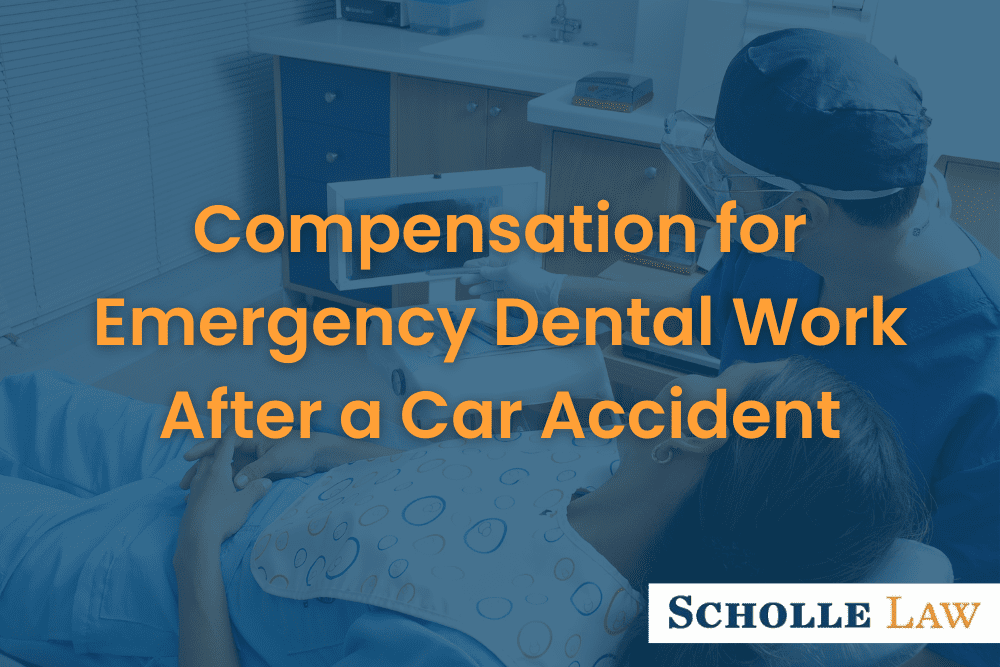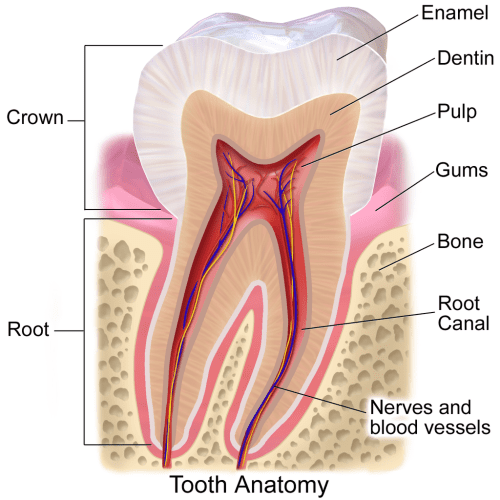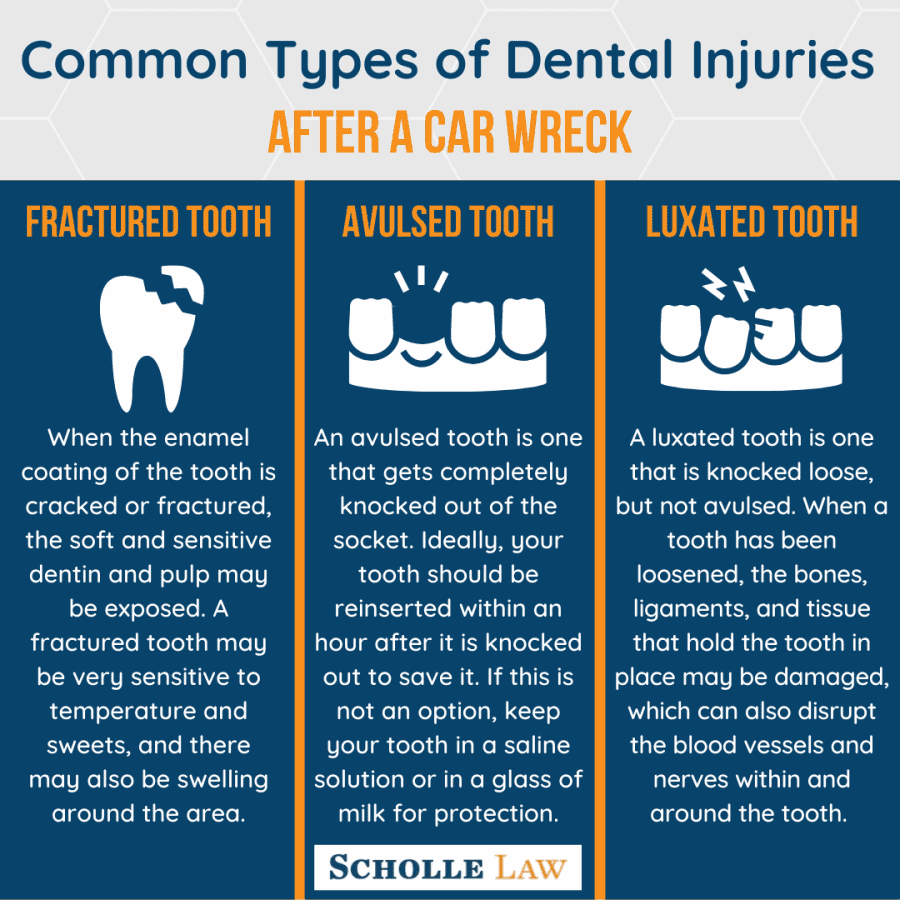
Car accidents can result in a variety of injuries, from cuts and bruises to nerve damage to life-altering brain damage. Of course, if you have ever been in a wreck (or have seen a crash in a move or TV show), you may be familiar with these injuries. What is often overlooked, however, is dental damage that can occur in a collision.
After a car accident, you may suffer from chipped, loosened, or missing teeth, jaw injuries, and more. You will most likely need emergency dental work done to repair the damage. Unfortunately, this type of treatment can be exceptionally expensive. In some cases, your health and/or dental insurance will cover this cost. But all too often, insurance companies treat this kind of treatment as purely cosmetic, and therefore not covered by your policy.
Even if your insurance company refuses to cover emergency dental work after a car accident, you may still be entitled to compensation for your injuries and expenses. The Lawrenceville car accident attorneys at Scholle Law are quite familiar with the tactics that insurance companies use to avoid paying what you deserve. Armed with this knowledge, we will fight for every penny of compensation owed to you.
If you have suffered dental damage or other injuries in a collision, we can help. Give us a call at (866) 592-1296 or contact us online today for a free, no-obligation consultation with a Lawrenceville car accident lawyer today.
Paying for Emergency Dental Treatment After a Car Wreck
Whether you fracture your tooth or it gets knocked out in a car accident, it is important to seek emergency dental treatment as soon as possible. The longer you wait to see the dentist, the more likely your injured tooth will not heal properly. Unfortunately, your insurance company may not see this kind of treatment as “medically necessary” and try to instead put it in the same category as elective plastic surgery.
This can mean that you are left to foot the bill for your treatment. If this is the case, make sure you explain to your dentist exactly what happened, and ask for images to be taken. If that is not an option, take photos of your injuries before any medical work is done. This will serve as evidence that your procedure was, in fact, medically necessary.
Many dentists offer payment plans or will otherwise bill you for the work done if your insurance will not pay (or you do not have dental insurance). This is especially true if your injuries were caused by a car wreck. Be sure to keep all bills, invoices, and receipts, whether you are paying out of pocket or not. Your attorney will use these documents to prove you deserve compensation.
If your insurance will not pay for the procedure and the dentist demands full payment, your Lawrenceville car accident attorney may be able to provide information about financing companies and other financial aid programs. These companies receive their payment out of any settlement or verdict you receive. It is important to make sure the financing company you work with is highly reputable and does not charge excessive interest rates.
Common Types of Dental Injuries After a Car Wreck
There are any number of ways you can sustain dental damage after a car wreck. For instance, you may hit your face on the steering wheel or dashboard, the airbag may knock out a tooth, or a side impact could break your jaw. No matter the cause, there are 3 main dental injuries that are common after a car accident:
Fractured Tooth
Car wrecks that result in a head or facial impact can fracture your teeth. These types of injuries can be extremely painful. When the enamel coating of the tooth is cracked or fractured, the soft and sensitive dentin and pulp may be exposed. A fractured tooth may be very sensitive to temperature and sweets, and there may also be swelling around the area.
Tooth fractures are divided into three categories by severity, called the Ellis Classification:
- Ellis Class I: This is a simple chip or fracture of the enamel itself. There is no exposed dentin, and pain should be minimal. Repairing a Class I fracture is typically considered cosmetic work, as there is no deep damage to the tooth.
- Ellis Class II: A Class II fracture is one that exposes the yellow dentin below the enamel. Dentin’s main function is to support the enamel of your teeth. Once it is exposed to air, it will likely be very painful and sensitive. If left untreated, a Class II fracture can become infected, and that infection can rapidly spread to other parts of the body if left untreated.
- Ellis Class III: When the pulp of your tooth is exposed, it is considered an Ellis Class III. Because the pulp of the tooth contains connective tissue, blood vessels, and nerves, exposing it to air is extremely painful. If you suffer a Class III fracture after a car wreck, seeking emergency dental work no more than 24 hours after the accident is highly recommended.
Avulsed Tooth
An avulsed tooth is one that gets completely knocked out of the socket. Saving an avulsed tooth requires immediate medical attention. Ideally, your tooth should be reinserted within an hour after it is knocked out to save it. If this is not an option, keep your tooth in a saline solution or in milk, which better protects the tooth from bacteria and damage.
According to Cleveland Clinic, you should pick up your tooth by the crown, not the root, as you want to avoid contaminating the part that goes into the gums. You should rinse the tooth with water or milk to get any dirt off; avoid drying or scrubbing it. If you cannot get to the dentist within an hour, gently place the tooth root first back into its socket, then bite down on a clean napkin, gauze, or piece of cloth to anchor the tooth back in place.
Even if you anchor the tooth, you will still need to visit the dentist as soon as possible. If you cannot find your avulsed tooth, you may have inhaled or swallowed it. Visit your doctor immediately to make sure you did not breathe in the tooth. If you can only find part of the tooth or the tooth is broken, do not try to reinsert it. The root or other parts of the tooth may still be in the gum.
Luxated Tooth
A luxated tooth is one that is knocked loose, but not avulsed. When a tooth has been loosened, the bones, ligaments, and tissue that hold the tooth in place may be damaged, which can also disrupt the blood vessels and nerves within and around the tooth. This can cause severe damage to the pulp and/or other parts of the tooth. Depending on the severity of the luxation, the tooth may be loose or angled, or it may simply be tender.
According to the Association of American Endodontists, there are five general types of luxated tooth injuries:
- Concussion injuries occur when the periodontal tissues (tissues that support the teeth and hold them in place) are damaged. The tooth generally does not become loose, but it will be tender. Your dentist will need to check for any pulp damage.
- Subluxation occurs when the tooth becomes loose, but is still in place. You may experience bleeding gums and sensitivity. Subluxations typically do not show up on X-rays, but there may still be damage to the pulp.
- Extrusive injuries occur when the tooth becomes loose and starts coming out of the socket. You may notice the tooth is incredibly loose and prolonged. While the tooth may be separated from the connective tissue, the actual socket is generally intact.
- Lateral injuries are defined by the tooth moving forward or backward in the gum line. The alveolar bone, which holds your teeth, is damaged, and the periodontal ligament separates. The pulp will most likely suffer damage.
- Intrusive luxation injuries occur when the tooth moves deeper into the socket. This results in the alveolar bone being fractured. While the tooth does not feel loose, there may be extensive damage to the periodontal tissue and tooth pulp.
Speak with a Gwinnett Car Accident Attorney Today
The most important first step to take if you have been injured in a car wreck is seeking medical care. This may include going to the emergency room, an urgent care clinic, or, in the event of a tooth injury, an emergency care dentist. Once you have had your injuries treated, the next step is to contact an experienced car accident lawyer.
At Scholle Law, we have been helping injured individuals get the full compensation they deserve after they have been injured. We know the tactics used by insurance companies to avoid paying you, and our attorneys will deal with them on your behalf so you can focus on healing.
If you have suffered dental damage or other injuries in a collision, we can help. Give us a call at (866) 592-1296 or contact us online today for a free, no-obligation consultation with a Lawrenceville car accident lawyer today.


